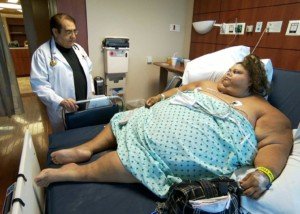Have you been hearing lately that it’s not healthy to have a lot of muscle?
This isn’t the same as saying that a very muscular person can still be unhealthy. What’s being said is that the actual muscle development itself – can be unhealthy.
The topic that usually brings out this statement is that of obesity being unhealthy.
Perhaps as a subconscious way of softening their admonitions to the “healthy at every size” camp, fitness coaches and trainers then toss in, as an afterthought, something like, “In fact, it’s not just having a lot of fat that’s bad for you, but even having too much muscle can be bad for you!”
There is a popular YouTube personal trainer, who specializes in morbidly obese clients, who has made the statement several times that being heavy with a lot of muscle (rather than fat) can be unhealthy.
He cites the diseases (e.g., stroke, type 2 diabetes, some cancers) that excess body fat can cause, but not surprisingly, never produces a list of medical ailments that significant muscle mass can supposedly cause.
That’s because there aren’t any. But what does a family practitioner have to say about this?
“Just being very muscular is not a major risk — as long as it was done ‘naturally,’” says Susan L. Besser, MD, with Mercy Medical Center, Baltimore; Diplomate, American Board of Obesity Medicine and board certified by the American Board of Family Medicine.
Posts are adding up on social media that having “too much muscle” (whatever “too much” is) is bad for the body.

Muscularity will never negatively affect this woman’s breast, reproductive, heart, joint, bone, intestinal or brain health. Shutterstock/AXL
If you truly believe big muscles are unhealthy, you should peruse medical journals for the causes of the top 10 killer diseases. See what comes up. And what doesn’t.
On what grounds can hypertrophy be unhealthy?
Or is this just a statement used by fitness experts to sound more convincing or relatable to those members of the fat acceptance camp who never weight train?
This Isn’t About Dangerous Performance Enhancing Drugs
“Using performance enhancing drugs or steroids to achieve the muscles isn’t healthy,” says Dr. Besser. These drugs can result in serious side effects.
But steroid use isn’t what this is about.
It’s about the concept that simply having substantial muscle development itself is bad for the body.
Is there a circumstance under which bodybuilding CAN be bad for the body?
“On the other hand, if your bodybuilder is focusing on only one area of muscular development — at the very least, that is unbalanced muscle development and potentially unhealthy, as it stresses the rest of the body by being disproportionate,” says Dr. Besser.
Every so often there is that bodybuilder who neglects what he can’t frontally see in the mirror: triceps and hamstrings.
And we’ve all seen the man with impressive muscle development only in his upper body. Though he trains his legs, they are too “skinny” for the rest of his body.
But these imbalances cannot possibly lead to systemic disease. The “unhealthiness” of a muscle imbalance could lead to soreness, aches, stiffness and an increased risk of musculoskeletal injury.
But certainly the chicken legs on that bodybuilder, or the neglected triceps behind the protruding biceps, will never lead to diabetes, high cholesterol, heart disease, hypertension, GERD or fatty liver disease.

Though the pursuit of hypertrophy may result in an injury, muscle size itself will not raise this man’s risk of disease or sickness. Shutterstock/andrimka
Human Heart Not Designed to Support 300 Pounds
In general this is true. But what if the 300 pounds is on a very tall bodybuilder who has low body fat?
You cannot possibly compare this man to a 300 pound woman who’s 50 percent body fat and only 5’4.

© Lorra Garrick
Additionally, most bodybuilders are well under 300 pounds. Even Lou Ferrigno (former Mr. Universe who played the Hulk in the TV series “The Incredible Hulk”) was around 275 at a height of 6’5, which is very tall for a competitive bodybuilder.
You can’t compare the heart of morbidly obese model Tess Holliday with the heart of a 6’7 strongman athlete.
What about the typical gym rat with major hypertrophy?
He may be around 240 or 250 and have a low body fat percentage. He may appear to be 270 in a photo due to enormously developed muscle, but actually be only 220 because he stands only 5’8.
But remember, his heart is trained to efficiently respond to physical stress and isn’t surrounded by a gelatinous layer of yellow fat as would an obese person’s.
If the typical muscled gym rat “has a healthy lifestyle with a mostly whole food diet, gets good sleep and does aerobic exercise in addition to static exercises (muscle building) to keep his cardiovascular system healthy — he is not ‘unhealthy’ and isn’t at significantly increased risk — as long as he maintains his exercise routine,” explains Dr. Besser.
What about those gigantic men who hold world records in various strength feats?
If they ever develop heart disease, diabetes or cancer, have a heart attack or stroke – you can be assured that the amount of muscle mass played NO role in the development of these conditions.
In a reality show about record-holding strongmen performing new feats of strength, their diet was briefly discussed: 10,000 calories a day.
They were shown gorging on unhealthy food. Later in the episode one was shown smoking a cigar.
It’s habits such as these that are high risk factors for disease. The size of one’s biceps or quadriceps play no role in sickness.
• There is zero evidence that muscularity is “unhealthy.” A muscular person may have a health problem, but not because they are muscular.
• “That’s not healthy” applies to what a person puts INSIDE their body (e.g., excessive sodium, excessive sugar, trans fats, liquor, smoke).
 Dr. Besser provides comprehensive family care, treating common and acute primary conditions like diabetes and hypertension. Her ongoing approach allows her the opportunity to provide accurate and critical diagnoses of more complex conditions and disorders.
Dr. Besser provides comprehensive family care, treating common and acute primary conditions like diabetes and hypertension. Her ongoing approach allows her the opportunity to provide accurate and critical diagnoses of more complex conditions and disorders.
 Lorra Garrick is a former personal trainer certified through the American Council on Exercise. At Bally Total Fitness she trained women and men of all ages for fat loss, muscle building, fitness and improved health.
Lorra Garrick is a former personal trainer certified through the American Council on Exercise. At Bally Total Fitness she trained women and men of all ages for fat loss, muscle building, fitness and improved health.
.










































